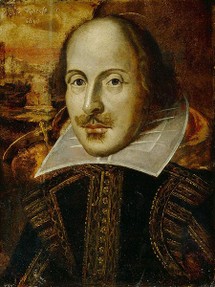 Shakespeare's Richard III is a villain, I'm not disputing that. However, as with all of Shakespeare's villains, he isn't evil for evil's sake. We know why he feels such hatred - he's been treated like a freak his entire life. He's been hardened by the cruelty he's received and he's determined to make the world pay. He's full of bitterness. self-pity and jealousy:
Shakespeare's Richard III is a villain, I'm not disputing that. However, as with all of Shakespeare's villains, he isn't evil for evil's sake. We know why he feels such hatred - he's been treated like a freak his entire life. He's been hardened by the cruelty he's received and he's determined to make the world pay. He's full of bitterness. self-pity and jealousy:
"I, in this weak piping time of peace,
Have no delight to pass away the time,
Unless to spy my shadow in the sun
And descant on mine own deformity:
And therefore, since I cannot prove a lover,
To entertain these fair well-spoken days,
I am determined to prove a villain
And hate the idle pleasures of these days."
In a way, don't we feel sorry for him? Yes, he's malicious and unfeeling, but Shakespeare suggests that there is a human being beneath all that - a man who is acting out of emotions we're all prone to. Yes, he takes them to the extreme, but there still remains a sympathetic character underneath those violent, vicious acts. And, considering Elizabeth may not take too kindly to a 'human' representation of Richard, that's really quite dangerous territory for Shakespeare to be walking.
But, even if you disagree with that view of Shakespeare's Richard III, there is one more reason that I think the Platagenet king should be grateful to the Bard of Avon: there would not be half as much interest in King Richard if it weren't for his infamous status as Shakespeare's villain.
Realistically speaking, he should have no more than a brief footnote in history - a king (albeit the last in the Plantagenet line) who ruled for just a little over two years. Surely, the reason people all over the world are still fascinated by Richard and his legacy is not the facts, but literature. It's all thanks to Shakespeare.
So, whether Shakespeare got him all wrong or not (and that's a question we can still not fully answer) is perhaps irrelevant. He created a character that is bigger than the real Richard and given the 15th century king a level of fame he could not possibly have dreamed of. Some of that notoriety he might not be too thrilled about, but it's better to be remembered (even if it's for something that's not true) than to be forgotten, isn't it?


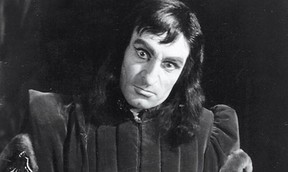 Before I write anything about Shakespeare's representation of Richard III, it's important to clarify that the Machiavellian schemer of The Tragedy of King Richard III isn't entirely a creation of the Bard's imagination; Shakespeare's source was
Before I write anything about Shakespeare's representation of Richard III, it's important to clarify that the Machiavellian schemer of The Tragedy of King Richard III isn't entirely a creation of the Bard's imagination; Shakespeare's source was 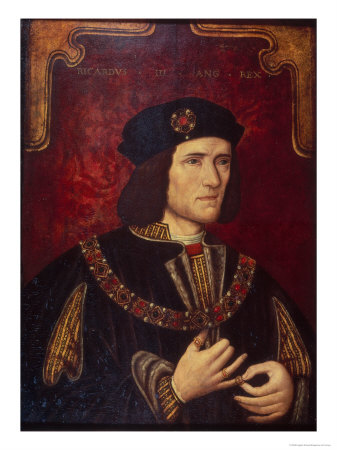


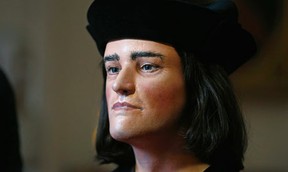 One of the expectations of The Richard III Society was that, by finding and exhuming Richard's body, his reputation would finally be redeemed - his remains would somehow prove that he was, after all, a decent guy and a good king.
One of the expectations of The Richard III Society was that, by finding and exhuming Richard's body, his reputation would finally be redeemed - his remains would somehow prove that he was, after all, a decent guy and a good king. Shakespeare's Richard III is a villain, I'm not disputing that. However, as with all of Shakespeare's villains, he isn't evil for evil's sake. We know why he feels such hatred - he's been treated like a freak his entire life. He's been hardened by the cruelty he's received and he's determined to make the world pay. He's full of bitterness. self-pity and jealousy:
Shakespeare's Richard III is a villain, I'm not disputing that. However, as with all of Shakespeare's villains, he isn't evil for evil's sake. We know why he feels such hatred - he's been treated like a freak his entire life. He's been hardened by the cruelty he's received and he's determined to make the world pay. He's full of bitterness. self-pity and jealousy:


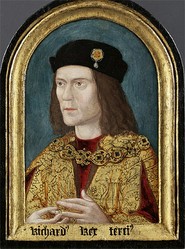

 How to Avoid College Debton 07/31/2014
How to Avoid College Debton 07/31/2014
 Was Charlotte Bronte Jealous of her Sister Anne?on 07/15/2014
Was Charlotte Bronte Jealous of her Sister Anne?on 07/15/2014
 Whose Side is Cancer Research UK on?on 07/06/2014
Whose Side is Cancer Research UK on?on 07/06/2014
 A Plot Summary of Electra by Sophocleson 07/05/2014
A Plot Summary of Electra by Sophocleson 07/05/2014

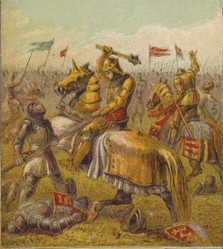

Comments
Hi, cmoneyspinner. Ian Mckellen is a fine actor, indeed! If you get the chance to see his Richard III, it's well worth the watch. Glad you enjoyed the article.
That Ian McKellen is an awesome actor. He does justice to Shakespeare's plays. Only thing I could "guess" about Richard III is that some people really didn't like him! Great article.
Hello, aingham69! Thanks for the comment. Very glad you found it interesting. While I think there's no question things were exaggerated about Richard, I agree that nobody in power during that era can come off squeaky clean - otherwise, they never would have found their way into power.
Such an interesting piece; thanks for sharing. I love the history of the monarchy, especially when it comes to the times of the Tudors and the Stuarts. Being from Yorkshire, I've always sided on Richard III, even knowing that he could possibly be the "villain". It's easy to put the blame on someone but we have no idea what the times during the 15th century were really like; just that there was a push for wanting more power.
Jo, sounds like great fun! You're right, I think there will be a few more people rooting for Richard this year. It's odd, because I truly believe that he's a sympathetic character in Shakespeare, so the revelations over the past few weeks haven't really changed my opinion. But you're quite right, now he's 'hot property' people are more likely to side with him.
The problem is, I think, we can get so wrapped up in this need to have goodies and baddies - and, of course, in struggles for power in the 15th century, there really was no such thing as a 'goody'.
This was really interesting. Thank you. I've been to the re-enactment at Bosworth, in August each year, a few times. It's always been most of the crowd shouting for Henry Tudor and a couple of rebels calling for Richard. The Richard III Society is always there, fielding questions and looking a bit besieged by questions about child murder.
I think it's going to be an interesting one this year. We're all going here. It's not so much that Richard is suddenly innocent, but he's suddenly a celebrity. That, in today's culture, amounts to pretty much the same thing.
That's very true. It's interesting that a play (or other work of fiction) can supersede the facts, though. Of course, in this case, the facts had already been distorted, which makes it that much more difficult to get to the truth. I think we may have to accept that we'll never know the definitive story of Richard's rise to power. To me, that makes him all the more intriguing!